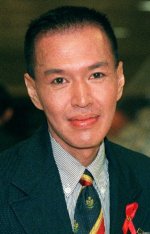To chew and not to be CHEW part II
 Singapore’s Strong Social Stigmas
Singapore’s Strong Social StigmasForget the symbolism in Singapore’s ban on selling chewing gum. Try instead to conjure the difficulties faced by the country’s first openly HIV+ activist who died in 1999, Paddy Chew. Paddy Chew faced many challenges when first diagnosed with the virus. Among them was the fact that the prescriptive “cocktails” were not locally available which forced him often to travel as far as Europe. By far Paddy’s greatest challenge in Singapore was not the lack of available medicine but the strong social stigmas towards infected persons in the country at that time. The same remains present to this day.
On Friday I left the office early to go see the doctor. This elicited questions from concerned co-workers about the nature of my visit. While I understood and very much welcomed their outward poring of concern, it prompted me to ask what someone would do in the event he/she had a serious illness that they wanted to keep private. One colleague remarked, “We would expect them to tell us, then we could try to comfort them.” When asked if the same would be true if the person was infected with HIV/AIDS, my colleague not surprisingly replied, “Of course not!” “You see, Peter, AIDS is seen as a result of people’s own immoral behavior.” Yes, here in Singapore and all over the world these sentiments are all too common. This conversation took place three weeks after the Anglican Church body in Kenya formally and publicly issued an apology for dealing with the disease as a “curse from God” upon sinners.
The truth is that to be Paddy Chew (meaning open about HIV+ status) here in Singapore today means a willingness to suffer scorn, judgment and severe public discrimination. As AIDS continues to be the silent killer here in Singapore and other parts of the world, people take pride in the notion that they do not know anyone that’s infected with the disease. It therefore remains an “abstract disease” prone to homosexuals and the morally corrupt. As long as these perceptions remain intact and unchallenged, we won’t see more infected persons wanting to be Paddy Chew. Fewer Paddy Chew’s in Singapore actually means more people will be less likely to get tested ─ avoiding a practice considered to be the first step in slowing the spread of the pandemic.
On Friday I left the office early to go see the doctor. This elicited questions from concerned co-workers about the nature of my visit. While I understood and very much welcomed their outward poring of concern, it prompted me to ask what someone would do in the event he/she had a serious illness that they wanted to keep private. One colleague remarked, “We would expect them to tell us, then we could try to comfort them.” When asked if the same would be true if the person was infected with HIV/AIDS, my colleague not surprisingly replied, “Of course not!” “You see, Peter, AIDS is seen as a result of people’s own immoral behavior.” Yes, here in Singapore and all over the world these sentiments are all too common. This conversation took place three weeks after the Anglican Church body in Kenya formally and publicly issued an apology for dealing with the disease as a “curse from God” upon sinners.
The truth is that to be Paddy Chew (meaning open about HIV+ status) here in Singapore today means a willingness to suffer scorn, judgment and severe public discrimination. As AIDS continues to be the silent killer here in Singapore and other parts of the world, people take pride in the notion that they do not know anyone that’s infected with the disease. It therefore remains an “abstract disease” prone to homosexuals and the morally corrupt. As long as these perceptions remain intact and unchallenged, we won’t see more infected persons wanting to be Paddy Chew. Fewer Paddy Chew’s in Singapore actually means more people will be less likely to get tested ─ avoiding a practice considered to be the first step in slowing the spread of the pandemic.





